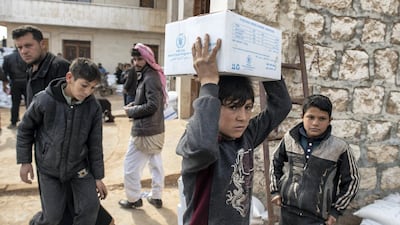Conservative Party rebels have failed in their bid to overturn the UK government's decision to slash the country's foreign aid budget.
The Speaker of the House of Commons, Sir Lindsay Hoyle, said on Monday the proposed amendment was "not within the scope" of a science bill MPs wanted to use as the vehicle to restore the budget.
Mr Hoyle said he shared the frustrations of MPs who suggested ministers were "riding roughshod over parliament" by failing to agree to a formal vote on the spending cut.
He will consider an emergency debate on the issue to be held on Tuesday.
"The government need to show respect and need to come forward," Mr Hoyle said.
"We are the elected members, this house should be taken seriously, and the government should be held accountable."
Andrew Mitchell, the former international development secretary who led the Tory rebellion, accused the government of acting unlawfully by reducing international aid from 0.7 per cent to 0.5 per cent of national income without first letting MPs vote on the measure.
"Had we secured a vote on a new clause tonight I can assure you it would have received the assent of the house by not less than a majority of nine, and probably around 20 votes," he said.
"In the week of the British chairmanship of the G7, the government's failure to address this issue means that hundreds of thousands of avoidable deaths will result. It's already attracting criticism from all round the world and the other members of the G7."
More than 30 MPs, including former prime minister Theresa May, said they were prepared to back the amendment if it went to a vote.
However, the government said the “temporary” cut from 0.7 per cent was needed, given that the pandemic had caused a "once-in-300-year economic interruption".
Dozens of aid agencies and the UN said the cuts will cause further suffering in countries such as Syria, Yemen and South Sudan.
David Davis, a former Brexit secretary, said on Monday a majority of MPs wanted the cuts reversed.
He said the cuts to clean water and food programmes would have “devastating consequences around the world”.
"You have massive cuts in clean water – 10 million people lose their access," he told BBC's Radio 4 Today programme.
“Cuts in funding for food … again, thousands will die, large numbers of them children. I’ve long been a critic of aid spending but doing it this way is so harmful.
“If you want to take a realpolitik argument, we are throwing away enormous influence, particularly in Africa where there is a very ideological battle with China. I mean morally, this is a devastating thing for us to have done."
Another of the dissenting Conservatives, Tom Tugendhat, chairman of the foreign affairs committee, said the cuts would harm Britain's reputation.
“The reality is that [we’re] trying to make sure that Britain’s foreign footprint, that global Britain, really means something,” he said.
Mr Mitchell earlier said the "eyes of the world are truly upon us" when the UK hosts the G7 summit in Cornwall later this week.
"But, in this moment, Britain is found wanting, because we have removed a foundational piece of our own global leadership. Britain is the only G7 nation cutting aid this year," he wrote in The Guardian.
“The cuts are already having a devastating effect on the ground, with projects being cancelled, clinics being closed, teachers being sacked. In crisis situations, these cuts will result in hundreds of thousands of preventable deaths.”
It is understood the rebels were willing to offer an olive branch to the government if ministers guarantee to return foreign aid spending to 0.7 per cent next year.
However, the government refused to compromise. Health Secretary Matt Hancock said the cut was "entirely reasonable" given spending during the pandemic.
ActionAid UK has cut its programmes in response to the funding shortfall, closing women’s shelters in Rwanda.
Lee Margaret Webster, the charity’s ambassador, said the total cut to the foreign aid budget of almost £4 billion ($5.6 billion) “barely made a dent in UK finances”.
“Even if maintained for five years the savings would reduce the UK’s debt levels by less than 1 per cent, but these cuts will mean an estimated 20 million women and girls will be left behind,” she said.
The government's supporters said the cut is temporary, necessary given the spending on the pandemic and popular with voters.
Ministers have pledged to restore aid spending to 0.7 per cent “when the fiscal situation allows”, but the government has not said when that is likely to happen.
Lucy Frazer, solicitor-general for England and Wales, said it was "important we support the effort" in the UK during the pandemic.
“Even without the 0.7 per cent this year we will be investing £10bn,” she told Sky News.
“But we are in the middle of a pandemic and it’s important we support the effort here as well.”
On Sunday, UN under-secretary-general for humanitarian affairs Mark Lowcock said the cuts represented a "failure of kindness and compassion".
“It is a failure of kindness and empathy. It’s a breach of a promise,” he told Times Radio.
“I’m afraid there’s no question that that costs lives. If you slash aid to starving Yemeni children, you know, they die. Likewise, in Syria.”

